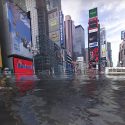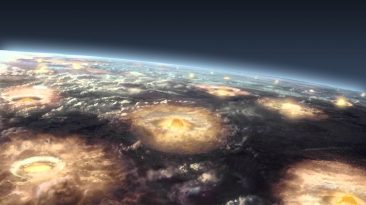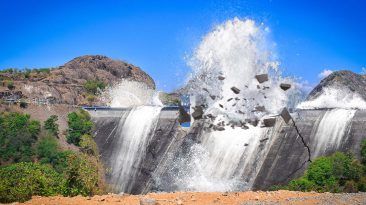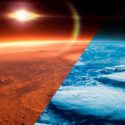It’s one of the most dangerous and mysterious places on Earth. It’s home to dozens of sunken ships, plane crashes, and dead people. It’s known as the Bermuda Triangle and is shrouded in mystery.
So, what would happen if we decided to dump our trash into it? Where would it go? And what mysteries would we solve by doing this?
The 1.3 million square kilometer (500,000 square mile) piece of ocean that is the Bermuda Triangle goes from Florida to Puerto Rico and then all the way to Bermuda. Since the 1800s, there have been nearly 1,000 reported incidents of people mysteriously disappearing in the area, ranging from small bush planes carrying just two passengers, to ships 150 meters (500 feet) long carrying over 300 people.
So, if we decided to put our trash here, would that disappear as well?
Before we even think of dumping our garbage into the Bermuda Triangle, we first need to figure out exactly how we’d get there. Naturally, we’d take a boat as we’re going to dump our trash into the sea, and a boat would allow us to carry more, and be more accurate as to where we want it to go.
You might be thinking that this is an incredibly risky move. Going right to the center of the Bermuda Triangle? Are you insane?
But there’s a pretty good chance that we’ll be just fine. There’s a number of theories, some good and some bad, as to what really happens in the Bermuda Triangle. Is it some crazy alien portal that’s abducting all our humans?
Is there a massive underwater city that’s underneath it? Or is there a scary sea monster living in it?
As fun as these theories might sound, they’re all incredibly far from the truth. Sorry about that.
One of the more plausible theories we have about the Bermuda Triangle disappearances has to do with methane explosions. The theory is that these methane explosions come up from the ocean floor, and erupt so violently, that they’re able to tip even the most massive ships.
But since this theory has been proposed, physicists, as well as ocean experts, have debunked it. They’ve said there’s virtually no chance of a methane explosion being big enough to topple over a boat.
And if there was a massive explosion, there’s a good chance the ship would survive. That’s because boats are built to handle massive changes in the water, including huge waves and even methane bubbles.
So now that we’re here with our trash, we can finally dump it. And we do just that. But now it seems to be just floating there, living in the ocean. Where’s the giant sinkhole that makes all our trash magically disappear?
Y’know, the same place that’s taken all these planes and boats over the years? It turns out that the Bermuda Triangle isn’t all that dangerous. Sure, it may be a little mysterious, but all these disappearances can be attributed to severe weather, massive waves, and human error.
The Bermuda Triangle isn’t even the most lethal body of water in the world. That title can be given to the oceans in East Asia and Australia.
And although nearly 1,000 deaths in the past 200 years might seem like a lot, it isn’t when you consider the fact that the Bermuda Triangle is one of the most heavily traveled areas of ocean and sky in the world. So sure, we’ll need to watch out for any hurricanes and big waves, but that’ll be the least of our worries for now.
We just dumped tons of trash into the ocean. We thought that maybe the Bermuda Triangle would somehow get rid of it, but this was a really dumb idea. Unfortunately, what we just did probably won’t even be all that noticeable in the sea.
An estimated 14 billion tons of trash is thrown into the ocean every year. Let’s say we threw all of New York’s trash, for a year, into the Bermuda Triangle. That’s 14 million tons of garbage.
It might sound like a lot, but it would only be a tiny fragment of the rest of the trash that’s tossed into the ocean each year. This was a pretty terrible idea, and definitely not one that should be attempted.
And it’s not for our safety, but for the safety of our ocean. Instead of adding to the problem, we should be helping to solve it by doing our best to clean the ocean.
Subscribe to What-If on YouTube or follow the show on Facebook Watch.
Sources
- “Is the Bermuda Triangle Really Dangerous? “. Writer, Mindy. 2016. livescience.com. Accessed November 12 2019.
- “Bermuda Triangle”. 2019. HISTORY. Accessed November 12 2019.
- “List of Bermuda Triangle incidents“. 2019. en.wikipedia.org. Accessed November 12 2019.
- “Bermuda Triangle: Where Facts Disappear”. Contributor, Benjamin. 2012. livescience.com. Accessed November 12 2019.
- “What Is Known (And Not Known) About The Bermuda Triangle”. 2019. Encyclopedia Britannica. Accessed November 12 2019.
- “What is the Bermuda Triangle?”. 2019. oceanservice.noaa.gov. Accessed November 12 2019.
- “Marine Debris And Plastics | Seastewards”. 2019. seastewards.org. Accessed November 12 2019.
- “The Future of NYC’s Waste: Getting to Zero” 2019. streeteasy.com. Accessed November 12 2019.



























